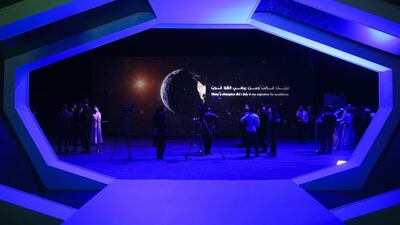ABU DHABI // The UK and the Mohammed bin Rashid Space Centre have joined in a year-long project to get more valuable data from their satellites.
The countries’ space agencies will use a technique called feature extraction, which will automatically monitor changes in the UAE by comparing data from different satellites.
Changes flagged could be useful for urban planners to keep track of local development, said Dr David Parker, chief executive of the UK Space Agency.
The data could also be used, for example, in detecting illegal fishing or the location of ships. Another type of advanced satellite can monitor and take pictures and other images through clouds, fog and at night.
“There are a lot of satellites that produce a lot of data but it’s got to be made useful to solve real problems down here on Earth,” Dr Parker said. “It’s not just about boys and big toys, it’s about how it affects the citizens.
“All these different sorts of data are about answering questions that cities, governments and the general population have.
“It’s a very specific project and this is all about the whole challenge of space at the moment.”
The technique has been used before but this project involves an advanced form combined with a satellite belonging to the UK company Elecnor Deimos.
“There’s the technical know-how from the UK and the access to satellite data from the UAE,” Dr Parker said. “We’re testing driverless cars in the UK and using that data to control autonomous vehicles.
“Not everyone likes driving but if you’re old, blind or maybe very young, you just jump into an autonomous vehicle and it uses satellite technology’s navigation data to get you to your destination safely.
“These are the kind of new satellite data applications coming along.”
The advanced technique will also make it easier for users to understand the information.
“At the moment, you have to be a bit of a technical specialist,” Dr Parker said. “There’s a lot of judgment needed with maybe only 50 per cent of reliance on the technique, and we want to get that up to 85 per cent.
“It’s really important to recognise that for the 21st century economy you need trained people, and space attracts people into science and technology in general.
“It’s really useful to solving everyday problems down here on Earth and it’s still the inspiration that there’s a whole new universe out there to explore.”
Sir Martin Sweeting, group executive chairman at Surrey Satellite Technology, said daily life was dependent on space, for domestic purposes, to drive the economy and to ensure security and well-being.
“Space is now open and available to all nations and individuals,” Mr Sweeting said. “The ubiquity of space has developed because of dramatic advances, and the emergence of highly capable small satellites has revolutionised access to space services in optical Earth observation and radar remote sensing.”
Talal Kaissi, chief of staff at the UAE Embassy Trade and Commercial Office in the US, said: “Today’s satellites link the globe, providing information and connectivity to hundreds of millions of people instantaneously.
“This information is all enabled by spacecraft orbiting overhead and today’s governments, enterprises, entrepreneurs and everyday people have the curiosity and the quest for resources that combine space activities.”
cmalek@thenational.ae

